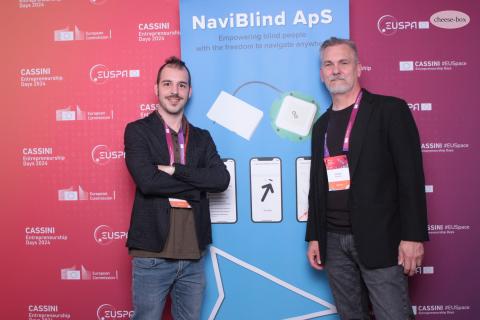When Emil, one of NaviBlind’s shareholders, moved from the suburbs of Copenhagen to the city center in 2018, he faced the challenge of navigating an entirely unfamiliar environment without sight.
This personal experience became the spark for NaviBlind, a deep-tech solution designed to make independent mobility safer and more accessible.
At its core, NaviBlind combines a lightweight cap with a mobile app that delivers centimeter-level navigation accuracy, far beyond what traditional GPS can offer. The system guides users with precise instructions, alerting them to turns, crossings, and obstacles, and correcting their route in real time.
From students reaching classrooms independently to travelers exploring new cities, NaviBlind is redefining autonomy. In partnership with the Danish Blind Society’s Youth section, the team even designed accessible routes along the El Camino de Santiago, allowing participants to experience the historic pilgrimage on their own terms.
We wanted to create something that wasn’t just a gadget. It’s a tool shaped by the community, built on dignity, confidence, and equal opportunity.
Alessandro Kartsiaklis, CEO of NaviBlind
A Turning Point with the EIT Community
Developing high-precision technology took years of testing, iteration, and resilience. But scaling it required something more: the right ecosystem of support. That breakthrough came in 2024, when NaviBlind joined the EIT Community New European Bauhaus Catalyse programme.
The initiative offered structure, mentorship, and a European network of partners and potential clients. Through tailored guidance, NaviBlind refined its business model, marketing approach, and growth strategy, drawing on insights from experienced mentors, whose expertise helped shape key design and commercial decisions. The EIT Community’s collaborative environment also connected the team with like-minded innovators and potential partners across Europe, giving their mission both visibility and momentum.
Support from EIT Urban Mobility’s SME Market Expansion Call also enabled NaviBlind to launch its first large-scale pilot in Berlin, testing the solution in one of Europe’s most complex cities.
The programme gave us focus, tools, and confidence. It accelerated our growth in ways we couldn’t have managed alone.
Alessandro Kartsiaklis, CEO of NaviBlind
Expanding Horizons
Recognized at the EU Research & Innovation Days for its contribution to inclusive urban design, NaviBlind continues to push boundaries. The company is now expanding across Europe and integrating AI and smart city data to create a truly universal navigation system for the visually impaired.
With the support of the EIT Community, NaviBlind proves how empathy, innovation, and collaboration can come together to make cities more accessible for everyone.



 Share this page
Share this page


